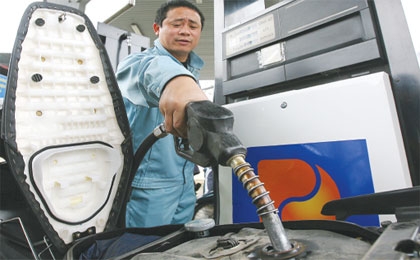Inflation to knock growth off its stride down growth
 |
| Recent petrol and power price rises could stoke the inflationary fires burning away at economic growth targets |
The General Statistics Office (GSO) last week reported that February consumer price index (CPI) soared 2.09 per cent against January, the highest increase over the last 30 months. The country’s CPI in 2011’s first two months rose by 3.87 per cent against 2010’s December and 12.24 per cent against last year’s corresponding period.
Food and foodstuff prices increased the most by 3.65 and 16.91 per cent again January and 2010’s first two months, respectively.
The GSO’s vice head Nguyen Bich Lam said that Vietnam’s CPI for 2011 would likely continue rising sharply due to last week’s power and petrol price hikes and an expected jump in coal prices. These would result in price hikes for most goods and services in the market.
Bui Ha, head of the Ministry of Planning and Investment’s (MPI) National Economic Issues, said that it was likely that the government would seek advice from the Politburo about revision of the economy’s growth rate for 2011 before submitting the issue to the National Assembly, due to inflation threats.
“It will be very difficult to restrain inflation at below 7 per cent for 2011, if we still strive for high economic growth rate of 7-7.5 per cent,” said Nguyen Duc Long, head of the State Bank’s Economic Research Section.
The National Assembly recently approved a resolution on 2011’s socio-economic development, in which the economy’s high inflation rate would be bridled at less than 7 per cent and the economy’s growth rate would be 7-7.5 per cent against 2010.
However, Lam said: “It is quite difficult to curb inflation. Besides Vietnam’s price-related problems, the world’s rising food prices and expanding inflation will also badly affect the country’s efforts to contain high inflation.”
At a meeting between the government with provincial authorities nationwide on December 31, 2010, MPI Minister Vo Hong Phuc noted that Vietnam’s economy in 2011 would continue facing high inflation threat, after 2010’s higher-than-expected CPI rise of 11.75 per cent.
“Based on our estimations about market developments, investment and 2010’s growth, we think that the target of ensuring the economic growth rate of over 7 per cent is feasible. But, it will be very hard to curb inflation at less than 7 per cent. Inflation will be one of the biggest headaches for us in 2011.
“We will find it more difficult to fight inflation than we did in previous years, because production costs for 2011 are expected to be much higher, not to mention bigger natural calamities and epidemics,” Phuc noted.
Prime Minister Nguyen Tan Dung last week reiterated the need to curb inflation as the government’s top priority.
The government recently also issued a resolution on bridling inflation, stabilising the macroeconomy and ensuring social security.
Under the resolution, Dung underlined the necessity to apply a tightened monetary policy by reducing credit growth target to less than 20 per cent, while targeting money supply growth of between 15-16 per cent in 2011 compared to the 23 per cent in 2010.
The resolution also prioritised credits for agricultural production, auxiliary industry, and gradually lowering interest rates.
Regarding the implementation of tightened fiscal policy, Dung also requested to raise budget collection by 7-8 per cent, cutting the government’s regular spending by 10 per cent and reducing state budget deficit to below 5 per cent.
Long said the government’s anti-inflation solutions could be successfully carried out, “if there is concerted implementation of monetary and fiscal policies and quality-oriented investment attraction policies”.
He said this week the State Bank would issue a particular solution package to implement the new resolution.
What the stars mean:
★ Poor ★ ★ Promising ★★★ Good ★★★★ Very good ★★★★★ Exceptional
Related Contents
Latest News
More News
- Foreign leaders extend congratulations to Party General Secretary To Lam (January 25, 2026 | 10:01)
- 14th National Party Congress wraps up with success (January 25, 2026 | 09:49)
- Congratulations from VFF Central Committee's int’l partners to 14th National Party Congress (January 25, 2026 | 09:46)
- 14th Party Central Committee unanimously elects To Lam as General Secretary (January 23, 2026 | 16:22)
- Worldwide congratulations underscore confidence in Vietnam’s 14th Party Congress (January 23, 2026 | 09:02)
- Political parties, organisations, int’l friends send congratulations to 14th National Party Congress (January 22, 2026 | 09:33)
- Press release on second working day of 14th National Party Congress (January 22, 2026 | 09:19)
- 14th National Party Congress: Japanese media highlight Vietnam’s growth targets (January 21, 2026 | 09:46)
- 14th National Party Congress: Driving force for Vietnam to continue renewal, innovation, breakthroughs (January 21, 2026 | 09:42)
- Vietnam remains spiritual support for progressive forces: Colombian party leader (January 21, 2026 | 08:00)

 Tag:
Tag:




















 Mobile Version
Mobile Version